Coffee Alternatives And Tea
The Coffee Alternative That’s Helping People Quit Sugar
Chicory root coffee could be the game-changer you need to conquer sugar cravings—discover how this delicious alternative can transform your journey!
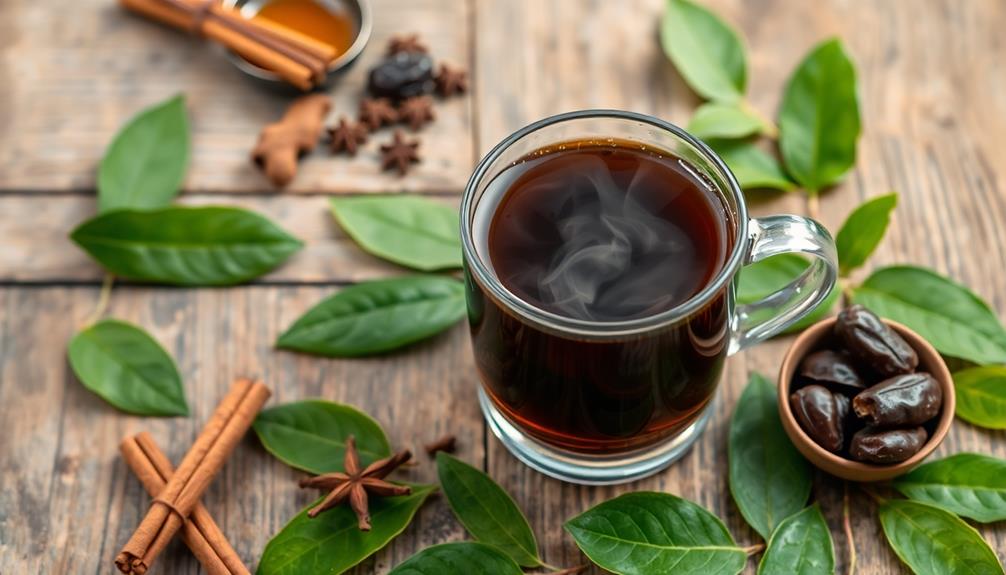
If you're looking to quit sugar, chicory root coffee could be your new best friend. This caffeine-free option mimics the rich flavor of traditional coffee without the jitters. It helps curb sugar cravings while providing a satisfying taste that keeps you coming back for more. Plus, by swapping out sugary drinks for chicory coffee, you'll find it easier to reduce your overall sugar intake. Combine this with healthier sweeteners like stevia or monk fruit, and you'll be on your way to better choices. There's so much more to discover that can support your journey toward a sugar-free life!
Key Takeaways
- Chicory Root Coffee: This caffeine-free alternative mimics coffee's flavor, helping to reduce sugar cravings without the jitters associated with caffeine.
- Herbal Teas: Naturally caffeine-free, herbal teas can satisfy the desire for warm beverages while avoiding added sugars and promoting hydration.
- Roasted Grain Beverages: These provide a nutty flavor and are caffeine-free, making them a satisfying substitute that can help reduce sugar dependency.
- Golden Milk: An anti-inflammatory drink made with turmeric and spices, this option is low in sugars and can replace sugary coffee drinks.
- Matcha: With lower caffeine content and rich antioxidants, matcha offers a healthier boost without the sugar crash associated with regular coffee.
Benefits of Quitting Sugar
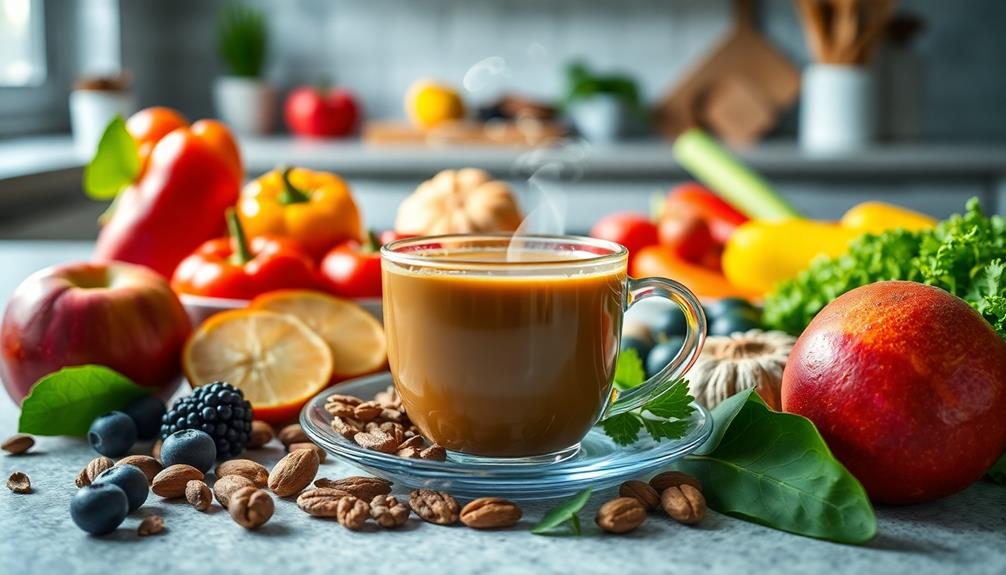
Quitting sugar can transform your health in remarkable ways. When you cut sugar from your diet, you'll likely notice improved insulin sensitivity, which can reduce your risk of type 2 diabetes and enhance your overall metabolic health.
This shift often leads to enhanced energy levels, helping you avoid those frustrating energy crashes that come with sugar highs and lows. Additionally, incorporating alternatives like health benefits of kombucha can provide a revitalizing way to support your journey towards reducing sugar intake.
Moreover, you might experience significant weight loss since you're cutting out empty calories that contribute to obesity and related health issues. As you reduce sugar intake, you'll also find that your cravings for other unhealthy foods diminish, promoting better dietary habits and a more balanced, nutritious diet.
Your skin health can improve, too. By quitting sugar, you reduce inflammation and lower the risk of acne breakouts, as excessive sugar consumption is linked to skin aging and conditions like rosacea.
With these health benefits, you'll likely feel more vibrant and energized. So, as you explore coffee alternatives, remember that quitting sugar is a powerful step towards a healthier, more fulfilling life.
Top Coffee Alternatives
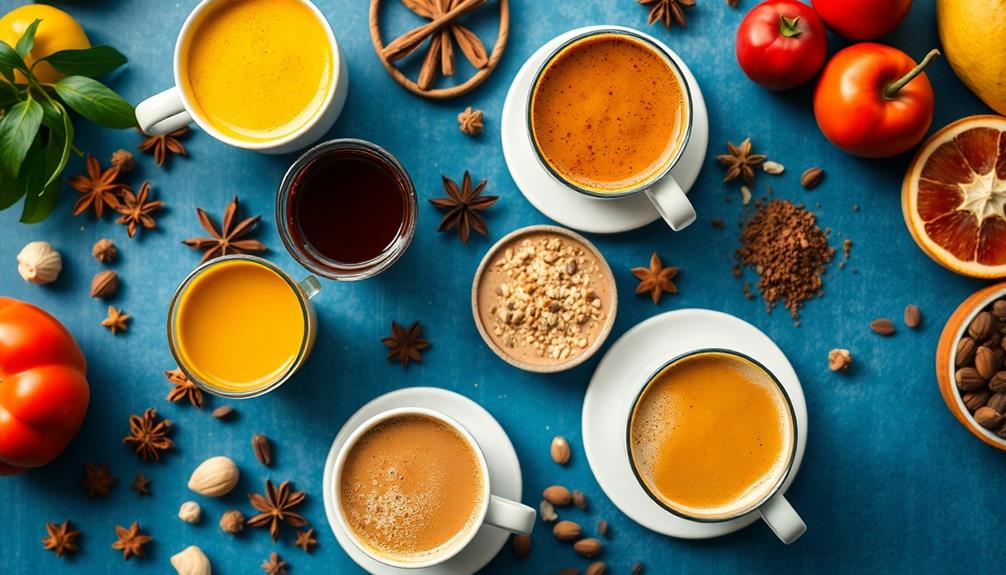
Finding a satisfying drink to replace your morning coffee can make your journey to reduce sugar intake even more enjoyable. Luckily, there are several excellent alternatives to coffee that can help curb sugar cravings. Incorporating aromatherapy into your routine can also promote relaxation and help manage stress, which may further reduce cravings for sugary snacks improved mood and emotional well-being.
Matcha is a fantastic choice, offering a lower caffeine content of about 30-50 mg per 8-oz serving. It's rich in antioxidants, which can be beneficial in managing those pesky sugar cravings.
If you're looking for a caffeine-free option, chicory root coffee mimics coffee's flavor perfectly, allowing you to enjoy a warm beverage without the jitters.
Herbal teas are another great alternative; they come in a variety of flavors and are completely caffeine-free, providing soothing options without added sugars.
Roasted grain beverages, like dandelion or roasted barley drinks, offer a nutty flavor similar to coffee and are naturally caffeine-free, helping to reduce sugar dependency.
Lastly, golden milk—a blend of turmeric and spices—serves as an anti-inflammatory alternative that can satisfy your taste buds while being low in sugars.
These alternatives to coffee can provide the energy boost you need without compromising your goal of reducing sugar intake.
Healthier Sweetener Options
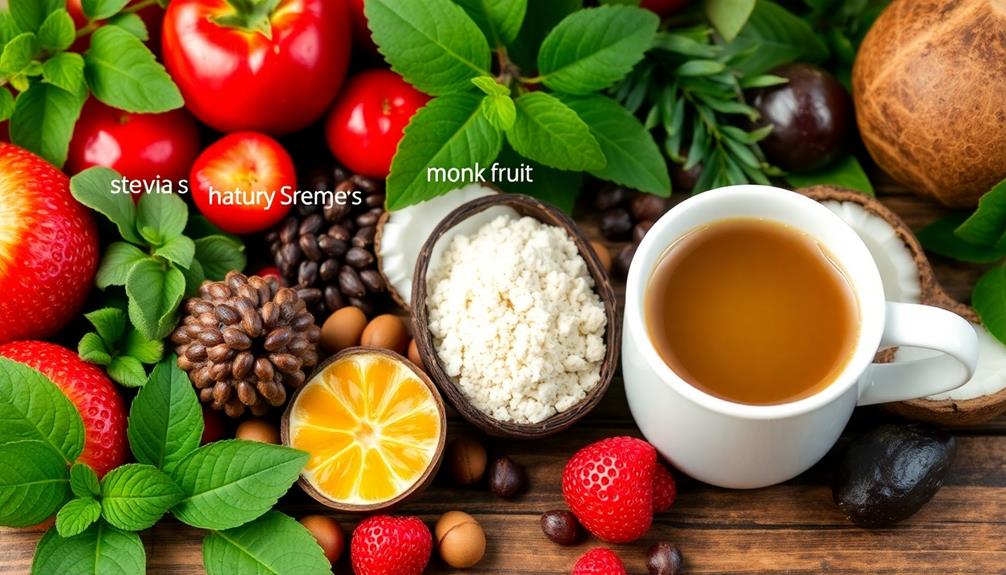
When it comes to reducing sugar intake, choosing healthier sweetener options can make a significant difference. You can easily swap out refined sugar for various natural sweeteners that not only satisfy your sweet tooth but also align with your health goals.
| Sweetener | Calories per gram | Key Benefits |
|---|---|---|
| Stevia | 0 | Zero calories, low glycemic index |
| Monk Fruit | 0 | Zero calories, no blood sugar spikes |
| Agave Nectar | 3 | Sweeter than sugar, low glycemic index |
| Coconut Sugar | 4 | Retains nutrients, less processed |
| Date Syrup | 3 | Rich in nutrients and antioxidants |
| Erythritol | 0.24 | Low-calorie, no blood sugar spikes |
Tips for a Smooth Transition
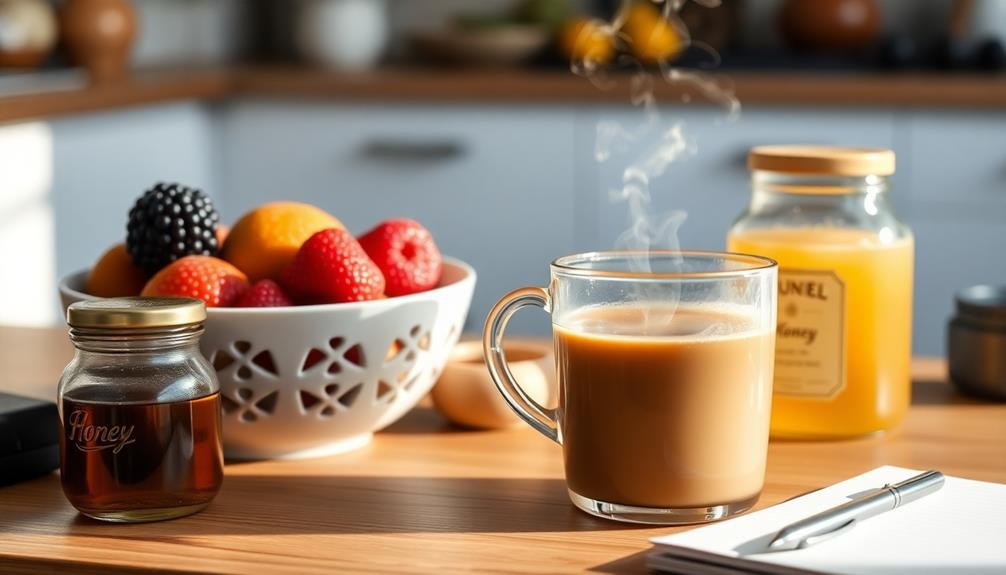
Shifting away from sugar can be challenging, especially in your daily coffee routine. To help you make this adjustment smoother, consider the following tips:
1. Gradually Reduce Sugar: Start replacing sugar in your coffee with natural alternatives like stevia or monk fruit. This way, you can lower your overall sugar intake without losing sweetness.
You might also consider exploring various coffee varieties, as numerous varieties available can offer unique flavor profiles that may reduce your desire for added sweetness.
2. Experiment with Spices: Try enhancing your coffee's flavor with spices like cinnamon or vanilla. These can provide a satisfying taste that keeps your cravings at bay while eliminating the need for added sugar.
3. Explore Herbal Teas: Incorporate beverages like herbal teas or chicory root coffee into your routine. These alternatives allow your palate to adjust to less sweetness over time.
Stay hydrated and maintain a balanced diet rich in whole foods to support your adjustment.
Being mindful of your coffee rituals can also help; replace them with healthier habits, such as enjoying a flavored herbal tea or a nutritious smoothie.
Community and Support Resources
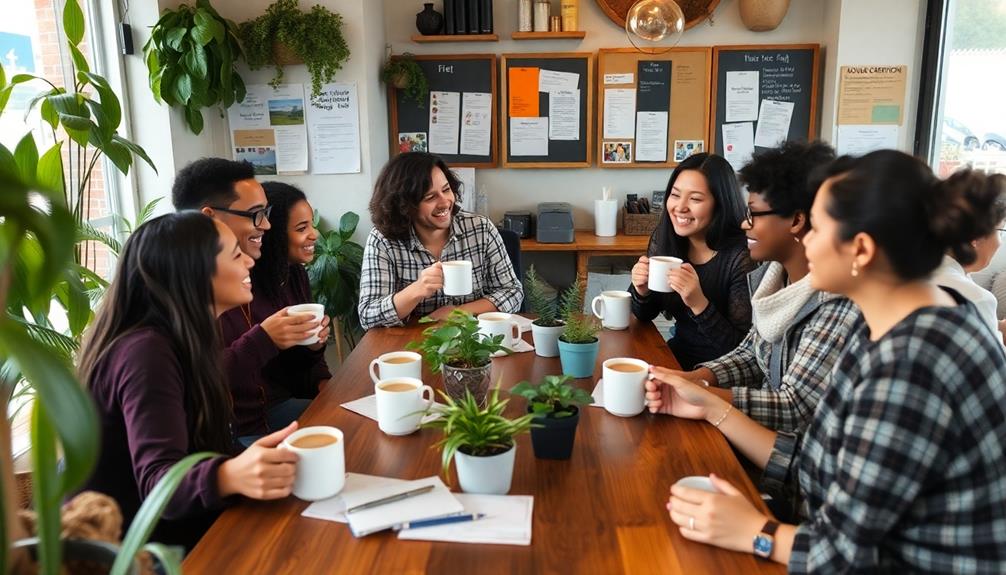
Support from others can make a significant difference as you work to quit sugar and explore coffee alternatives. Engaging with a community can provide the motivation and accountability you need. Whether it's local support groups or online forums, these resources connect you with individuals who share similar goals.
Consider participating in workshops that focus on healthier lifestyle choices, where you can learn new recipes and share success stories. Celebrating milestones, like going a week without sugar, can also boost your morale and commitment.
Here's a quick overview of some valuable community resources:
| Resource Type | Examples | Benefits |
|---|---|---|
| Online Groups | Social media forums | Community support & shared tips |
| Local Support | Meetups & workshops | Motivation & accountability |
| Blogs & Websites | Sugar-free living sites | Recipes & success stories |
Utilizing these resources can ease your shift to a sugar-free lifestyle. Surrounding yourself with supportive individuals will help you stay inspired and focused on your journey toward healthier choices.
Frequently Asked Questions
What Is a Good Coffee Alternative to Sugar?
If you're looking for a good coffee alternative to sugar, consider stevia or monk fruit. They're low-calorie, natural sweeteners that add sweetness without the calories, helping you enjoy your coffee without the sugar spike.
What Is the Best Replacement for Coffee?
If you're looking for the best replacement for coffee, consider matcha for a smooth energy boost, chicory root coffee for a caffeine-free option, or herbal teas for a relaxing, soothing experience without the jitters.
What to Drink in the Morning Instead of Coffee or Tea?
You might think mornings need coffee or tea, but try warm golden milk, herbal teas, or chicory root coffee instead. These options offer unique flavors and benefits that can energize your mornings without caffeine.
What Is Coffee Without Sugar Called?
Coffee without sugar is commonly called black coffee. When you enjoy it this way, you get to savor the rich, bold flavors of the beans without any added sweetness, making it a healthier choice overall.
Conclusion
Quitting sugar can transform your health and energy levels, making you feel more vibrant and alive. By exploring coffee alternatives, healthier sweeteners, and support resources, you're setting yourself up for success. Remember, "slow and steady wins the race." Each small change you make brings you closer to a sugar-free lifestyle. Embrace the journey, and celebrate your progress along the way. With determination and the right tools, you can conquer your cravings and thrive!
In the vast and diverse world of coffee, coffee alternatives, and tea, Olivia has found her calling. As an author and a dedicated coffee and tea aficionado, her work for Cappuccino Oracle reflects her profound love and understanding of the intricate complexities found within these beverages. Olivia’s passion for the subject serves as both a catalyst for her creativity and a connection point with her audience.
Olivia’s appreciation for coffee, coffee alternatives, and tea blossomed at an early age. She discovered that these beverages invigorated her senses and stimulated her creative spirit. From the nuanced flavors of single-origin roasts to the captivating narratives intertwined with coffee, coffee alternatives, and tea trade and culture, Olivia found an unlimited source of inspiration in her daily cup.
Her love for these beverages and her talent for storytelling eventually converged at Cappuccino Oracle. As an author, Olivia’s mission is to illuminate the intricate tapestry that makes up the world of coffee, coffee alternatives, and tea. Her articles span a diverse range of topics, encompassing everything from the unique flavors of different brews to the sociocultural history intertwined with their cultivation and consumption.
Coffee Alternatives And Tea
Is This Exotic Bean the New Coffee? Experts Say Yes!
Learn why experts believe exotic beans are revolutionizing the coffee world, and discover which rare varieties you need to try next!
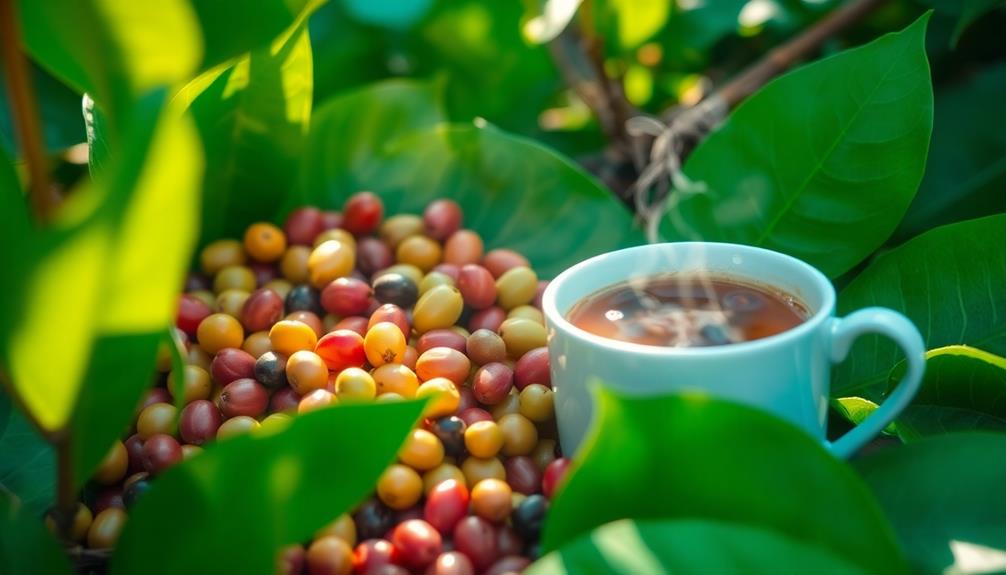
Yes, exotic beans are indeed the new coffee! You'll find that their unique flavor profiles, like floral and earthy notes, often surprise even the most seasoned coffee drinkers. As specialty coffee shops embrace these rare varieties, prices can soar to over $1,000 per pound, driven by their limited supply and meticulous production. Health benefits, such as lower acidity and antioxidant properties, make them even more appealing. Plus, sustainable sourcing practices guarantee that farmers are fairly compensated. Curious about which exotic beans are worth trying? There's plenty more to explore in this fascinating coffee trend!
Key Takeaways
- Exotic coffee varieties, like Geisha and Black Ivory, are gaining popularity due to their unique flavor profiles and high-quality production methods.
- The high price of exotic beans reflects their rarity and meticulous sourcing, making them a sought-after choice for coffee enthusiasts.
- Specialty coffee shops are increasingly focusing on rare offerings, enhancing consumer interest in exotic beans and unique brewing techniques.
- Health benefits associated with exotic coffee, such as lower acidity and antioxidant properties, contribute to their appeal among health-conscious consumers.
- Growing demand for ethical and sustainable sourcing practices supports the rise of exotic coffees, aligning with consumer values and preferences.
The Rise of Exotic Coffee
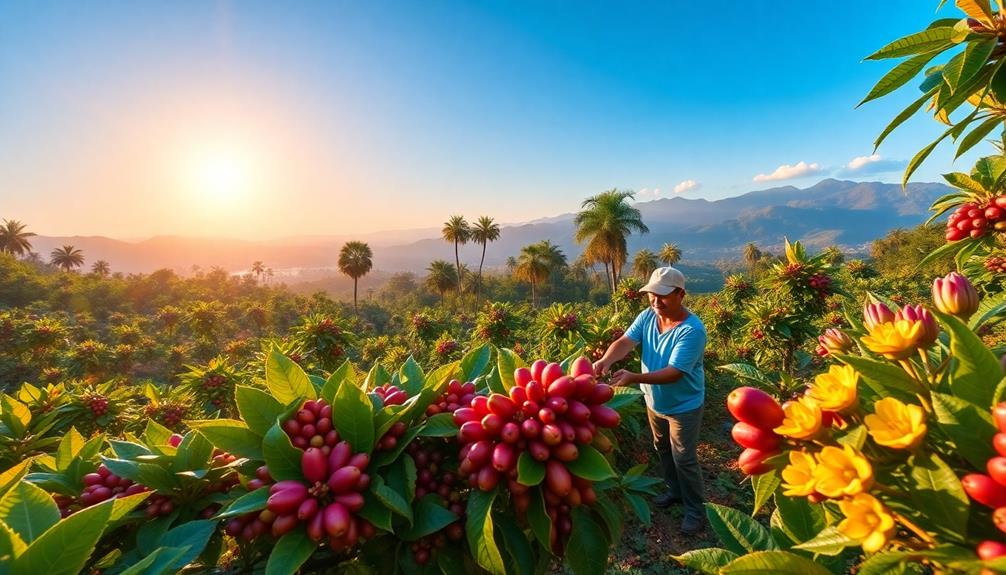
In recent years, the exotic coffee market has skyrocketed, capturing the attention of enthusiasts and casual drinkers alike.
You've probably heard of exotic coffee varieties like Black Ivory Coffee from Thailand and Kopi Luwak from Indonesia, which use unique processing methods that enhance flavor and contribute to their high prices—sometimes exceeding $1,000 per pound. The rarity and unique nature of beans such as Geisha coffee, fetching over $600 per pound, make them highly coveted by coffee connoisseurs.
Additionally, the impact of these rare beans on coffee quality and sourcing highlights the importance of direct trade relationships with farmers to guarantee premium taste.
As demand for exotic coffee rises, you'll find more specialty coffee shops and brands focusing on these rare offerings from around the world.
Consumers like you're seeking premium experiences, and brands are responding by emphasizing sourcing and traceability, guaranteeing you get the best quality beans. Ethical sourcing and sustainability practices are becoming essential, with many companies prioritizing fair trade and eco-friendly initiatives to support the farmers who grow these exquisite coffees.
The luxury coffee market is flourishing, with brands like Blue Bottle Coffee and Intelligentsia Coffee showcasing small-batch roasting and direct relationships with producers, allowing you to enjoy exceptional quality while savoring your next cup.
Unique Flavor Profiles
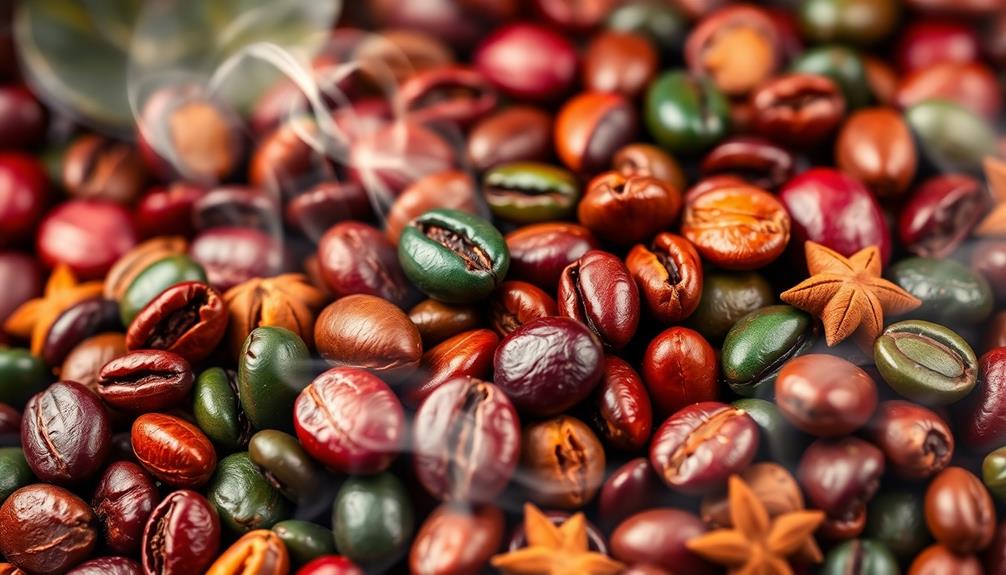
When you explore exotic beans, you'll discover a world of flavor complexity and balance that sets each variety apart.
Unique sourcing methods, like the elephant digestion process used in Black Ivory Coffee, create distinct taste experiences you won't find in typical brews.
Additionally, the unique characteristics of cacao beans, such as their rich and sweet flavor profile, offer a delightful contrast to traditional coffee.
Each cup tells a story, inviting you to appreciate the intricate characteristics that define these rare coffees, including caffeine content differences that enhance your tasting experience.
Flavor Complexity and Balance
Exotic coffee beans frequently surprise enthusiasts with their rich and complex flavor profiles that set them apart from regular varieties. You'll find that these beans often showcase a delightful balance of tasting notes, ranging from floral and fruity to earthy and chocolatey.
The medium roast options are especially praised for their flavor complexity, offering unique varieties that challenge your traditional coffee expectations. Additionally, the careful sourcing of these beans can mirror the meticulous attention seen in products like air purifiers, which prioritize user satisfaction through quality and performance.
What makes these exotic coffees stand out isn't just their origin but also the unique processing methods involved. Techniques like Black Ivory Coffee's elephant digestion or Kopi Luwak's civet cat involvement contribute to creating distinctive taste characteristics. This careful sourcing and roasting enhance their overall flavor complexity.
In addition to medium roasts, dark roasts among exotic varieties are celebrated for their rich mocha and cocoa flavors, often paired with low acidity for a smooth drinking experience.
As you explore these options, you'll appreciate how the balance of flavors can elevate your coffee experience, making every sip an adventure in taste. So, if you're ready to broaden your coffee horizons, these exotic beans might just be your new favorite brew.
Unique Sourcing Methods
Unique sourcing methods play an essential role in defining the flavor profiles of exotic coffee beans. By focusing on traceability and ethical sourcing, you can guarantee that the beans you enjoy come from high-quality origins. This commitment to sustainable practices not only enhances the flavor but also supports coffee farmers.
Here's a quick overview of some unique sourcing methods and their flavor impacts:
| Coffee Type | Sourcing Method | Flavor Profile |
|---|---|---|
| Black Ivory Coffee | Digestion by elephants | Bold earthy notes, mellow acidity |
| Geisha Coffee | High-altitude cultivation | Floral, tea-like attributes |
| Kopi Luwak | Fermentation through civets | Chocolate hints |
Health Benefits of Exotic Beans

While many coffee drinkers enjoy their daily brew for its rich flavor, the health benefits of exotic beans are equally compelling. Exotic coffee varieties, such as Geisha and Yirgacheffe, are packed with beneficial compounds like chlorogenic acids that can boost metabolism and lower the risk of chronic diseases.
Remarkably, herbal teas also offer a variety of health benefits, including aiding digestion and promoting relaxation. When you choose these unique blends, you're not just indulging your taste buds; you're also making a choice for your health.
The fermentation process used in some exotic beans, like those from Black Ivory Coffee, enhances their antioxidant properties, providing even more health benefits. Additionally, many of these beans come from organic and fair trade farms, minimizing your exposure to harmful pesticides and mycotoxins, which promotes overall well-being.
Another advantage of exotic beans is their lower acidity levels. This characteristic makes them gentler on the stomach, making them a great option for those with acid sensitivities.
Sourcing and Sustainability
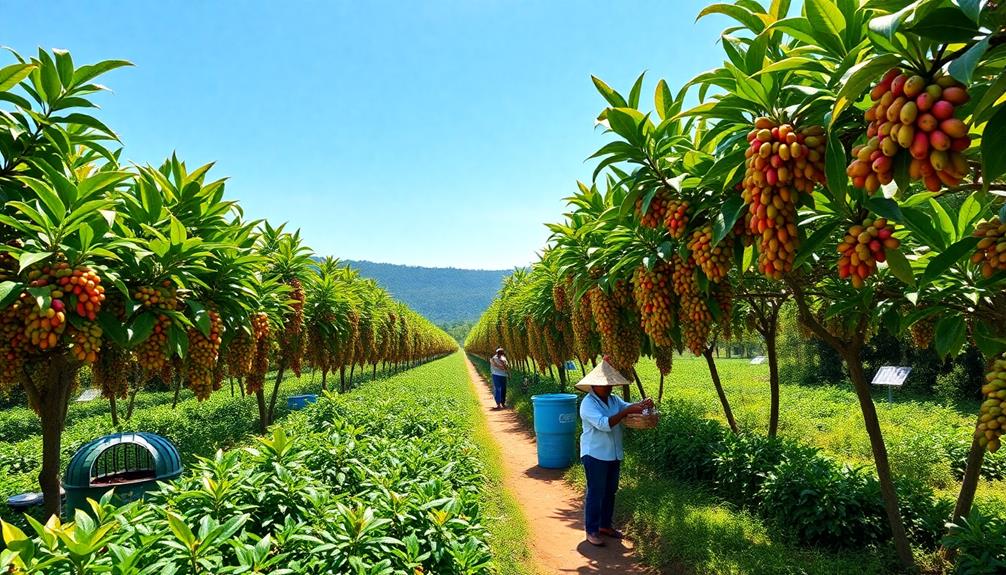
When enjoying the rich flavors and health benefits of exotic coffee beans, it's important to contemplate how they're sourced and the sustainability practices behind them. Sourcing these beans often emphasizes fair trade practices, ensuring that farmers receive a fair price for their high-quality products. This not only improves their living conditions but also supports sustainable farming methods.
Additionally, similar to how investing in precious metals can enhance portfolio resilience, sustainable coffee sourcing contributes to the stability of the agricultural economy.
The sustainability of exotic coffee involves transparent supply chains, allowing you to trace the origin of your coffee and promoting ethical sourcing. Many producers prioritize organic farming methods, eliminating harmful pesticides and fostering biodiversity in coffee-growing regions.
Consider these key points about sourcing and sustainability:
- Fair Trade Practices: Farmers get fair compensation, improving their livelihoods.
- Organic Farming Methods: Promote environmental health by avoiding toxic chemicals.
- Preservation of Ecosystems: Sustainable sourcing contributes to the longevity of unique coffee varieties and local communities.
As consumer demand for exotic coffee rises, investments in sustainable farming practices increase, benefiting both the environment and the quality of the beans you enjoy.
The Price of Rarity
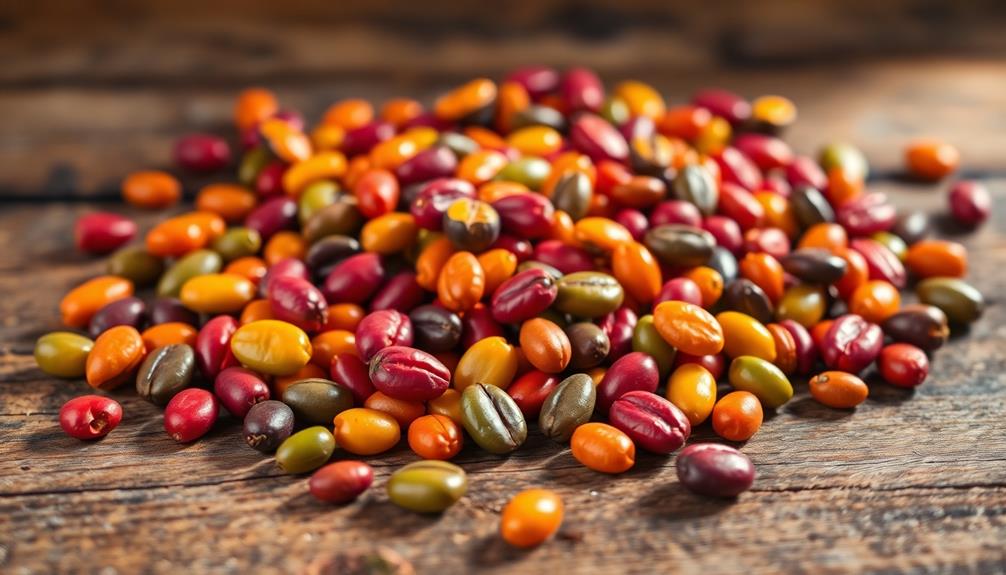
The allure of exotic coffee lies not just in its flavor but in its price, reflecting the rarity and meticulous care that goes into each batch. Exotic coffee varieties, such as Geisha and Black Ivory, often command premium prices that can exceed $600 per pound for Geisha coffee alone. The limited supply of these beans, sourced from specific regions like Ethiopia and Panama, considerably drives up their market prices, with records surpassing $2,000 per pound for green coffee.
Additionally, the unique brewing methods and flavor profiles, such as those found in caffeine content in espresso, contribute to the fascination surrounding these beans. This high demand for such rare coffees transforms them into luxury items for enthusiasts and collectors.
The intricate harvesting and processing techniques, including animal-assisted methods for Black Ivory coffee, justify these steep price tags. Furthermore, consumers often perceive the higher costs as a reflection of quality and sustainability. Many brands emphasize ethical sourcing and fair trade practices, ensuring that the farmers are compensated fairly for their hard work.
In this way, the price of these exotic coffees isn't just about rarity; it's also about supporting responsible practices in an increasingly conscious market. As you explore these unique beans, you'll appreciate not only the flavor but the story behind each cup.
Customer Experiences and Satisfaction
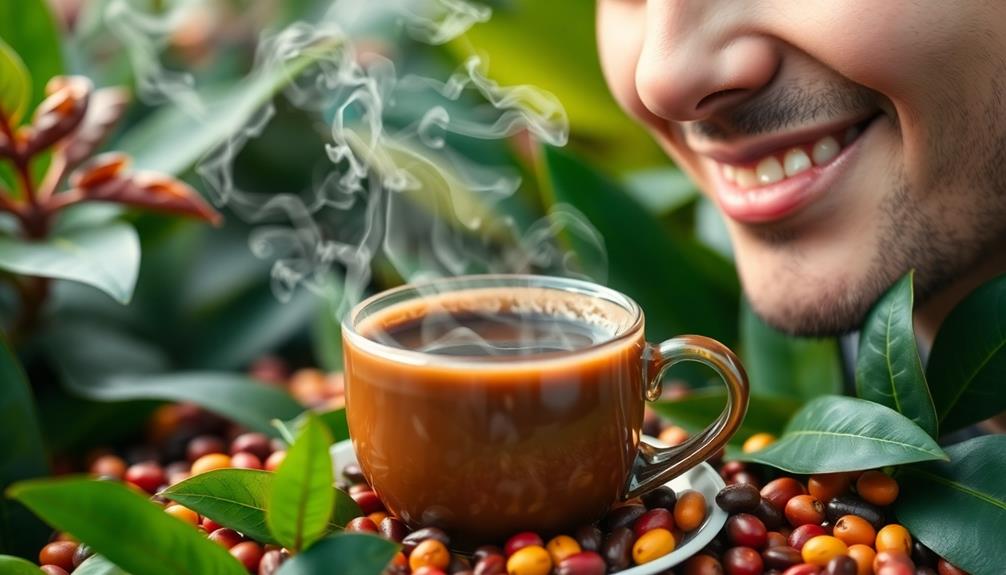
When you sip on The Exotic Bean's decaf coffee, it's hard not to notice its rich body and exceptional taste that sets it apart from the competition.
Many customers, just like you, have found unique flavor discoveries in the 50/50 blend of medium and dark roast, consistently praising its quality.
Much like how Dirt Cups can be customized with various toppings, the versatility of this coffee blend allows for personalized enjoyment.
With quick shipping and attentive customer service, your experience only gets better, making you feel valued and satisfied with every order.
Decaf Coffee Praise
Many customers rave about the decaf coffee from The Exotic Bean, highlighting its rich body and superior flavor that often outshines competitors. If you're shifting from pricier brands, you'll likely find yourself pleasantly surprised by the quality and taste.
Many loyal fans have established regular orders, keen to enjoy the exceptional 50/50 blend of medium and dark roast. A great beverage can pair well with a healthy breakfast, especially when you consider choosing a healthy breakfast that complements your coffee experience.
Here's what makes The Exotic Bean's decaf coffee stand out:
- Rich Body: The coffee provides a satisfying mouthfeel, making it feel indulgent without the caffeine jitters.
- Complex Flavors: Customers frequently mention the depth of taste, appreciating the nuanced profiles that develop with each sip.
- Low Acidity: This feature allows you to enjoy your cup without the harshness that can accompany other decaf options.
Customers have expressed feeling "ripped off" by previous costly decaf brands, now finding great value in The Exotic Bean's offerings.
With its commitment to quality, it's no wonder that the decaf coffee remains a favorite among those seeking both taste and satisfaction. You might just find your new go-to beverage!
Unique Flavor Discoveries
Customers of The Exotic Bean are uncovering a world of unique flavor discoveries that elevate their coffee experience beyond the ordinary. Many are thrilled by the rich body and superior taste of the fresh roasted decaf coffee, leading to high customer satisfaction and regular reorders.
The standout 50/50 blend of medium and dark roast has garnered exceptional feedback for its complex flavors, often surpassing what customers expected from competitors. As you enjoy your coffee, consider enhancing your home ambiance with seasonal decor like GEEORY Fall Pillow Covers that can complement your coffee ritual.
You might find yourself shifting from expensive brands, feeling like you've been "ripped off" by previous purchases. The Exotic Bean offers quality and value that truly impresses. With fresh roasted coffee dispatched on the same day, you'll appreciate the vibrant flavors that greet you each morning.
Additionally, positive interactions with the owner demonstrate a commitment to outstanding customer service, further enhancing your experience. As you explore these exotic coffee offerings, you'll likely discover consistency in quality and flavor across multiple purchases.
This reliability has established a loyal customer base that wholeheartedly recommends The Exotic Bean for anyone seeking an unparalleled coffee experience. Embrace the unique flavor discoveries, and elevate your coffee ritual today!
Consistent Quality Assurance
Here's the revised content:
How does The Exotic Bean maintain such high levels of customer satisfaction? It starts with their commitment to consistent quality assurance. Customers rave about the decaf coffee, noting its rich body and superior taste compared to other brands.
You'll find that many loyal customers reorder regularly, reflecting their satisfaction with the fresh, roasted coffee that The Exotic Bean delivers. Additionally, coffee's health benefits such as improving cognitive function can enhance the overall experience for consumers.
Here are some key factors contributing to their success:
- Unique 50/50 Blend: The combination of medium and dark roast creates exceptional natural flavors that stand out.
- Value for Money: Customers moving from pricey brands often feel "ripped off," appreciating the quality and flavor without the hefty price tag.
- Quick Shipping: Fresh roasted coffee is dispatched on the same day, guaranteeing you receive the best coffee experience possible.
With these elements in place, it's no wonder The Exotic Bean has garnered such a loyal customer base.
Their dedication to delivering high-quality coffee while maintaining excellent customer service guarantees that you'll keep coming back for more. Enjoy your next cup, knowing it's crafted with care!
Brewing Techniques for Exotic Coffee
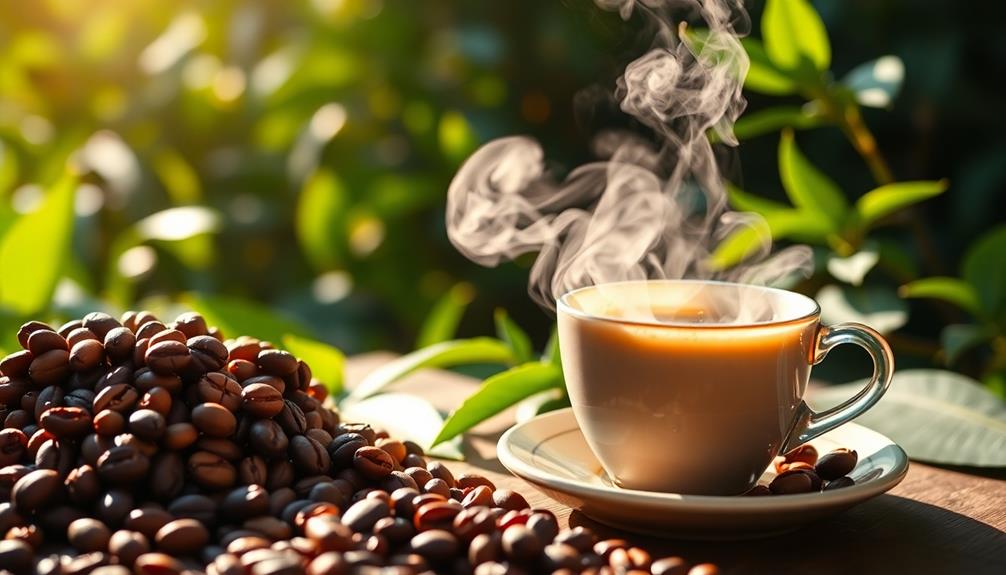
Brewing exotic coffee at home can be a delightful experience, especially when you use methods like pour-over, French press, or espresso. These techniques allow you to have precise control over flavor extraction, guaranteeing each brewed cup is rich and aromatic.
When using the pour-over coffee brewing method, it's crucial to grind your exotic coffee beans just before brewing. Freshly ground coffee releases carbon dioxide, enhancing the overall aroma and taste.
For ideal flavor, measure your coffee and water accurately. A good rule of thumb is a 1:15 ratio—1 gram of coffee for every 15 grams of water. This balance helps in achieving a well-rounded brew.
Make sure to maintain the water temperature between 195°F and 205°F (90°C to 96°C) during brewing, as this range is perfect for extracting the complex flavors found in exotic coffee beans.
Store your luxury coffee beans in an airtight container in a cool, dark place, and aim to use them within 2-4 weeks post-roasting. This guarantees that you enjoy coffee that's truly fresh and flavorful, making each cup a memorable experience.
Popular Exotic Coffee Varieties
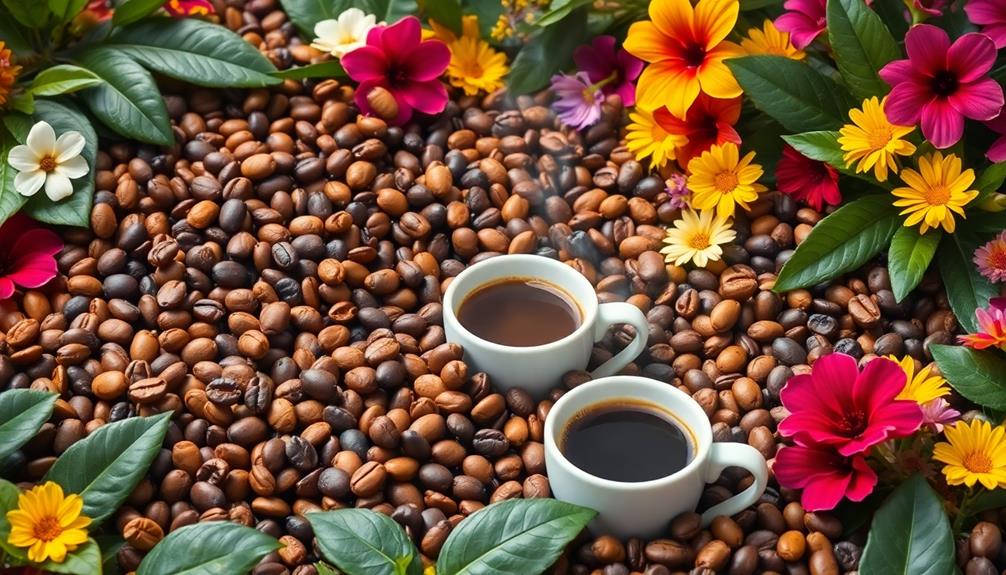
Exotic coffee varieties have captured the hearts of coffee lovers around the world, each offering unique flavor experiences.
If you're looking to explore some of the most sought-after coffees, here are a few that stand out:
- Geisha coffee: Originating from Ethiopia, this variety is famous for its exceptional flavor profiles, with prices often exceeding $600 per pound.
- Jamaican Blue Mountain coffee: Known for its smooth, mild flavor, this coffee is considered one of the best globally, thanks to its unique growing conditions and limited supply.
- Indonesian Kopi Luwak: This intriguing coffee is made from beans digested and excreted by civet cats, offering hints of chocolate and a meticulous, ethical production process.
Don't overlook Ethiopian Yirgacheffe, celebrated for its floral and tea-like flavors, perfect for those who appreciate complexity.
Meanwhile, Panama Geisha has gained a reputation for its distinct floral notes and limited yield, making it a luxurious choice for serious coffee enthusiasts.
Each of these varieties promises an unforgettable experience, inviting you to savor the rich world of exotic coffee.
The Future of Coffee Trends
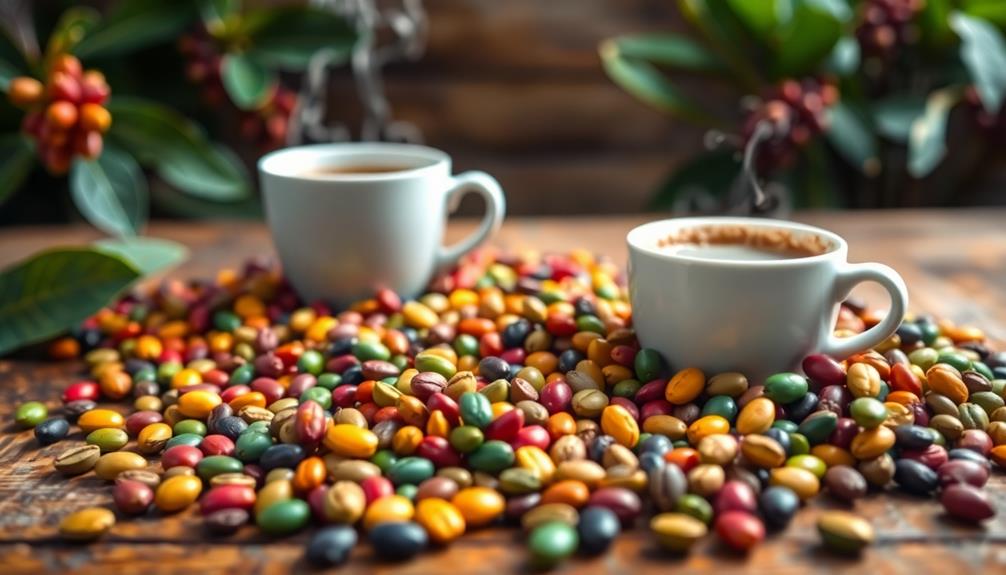
What makes the future of coffee so exciting? The landscape is shifting, driven by your demand for specialty coffee that offers unique flavor profiles and sustainable sourcing. More than ever, you're seeking rare beans like Geisha and Black Ivory, while prioritizing ethical practices.
Here's how trends are shaping your coffee experience:
| Trend | Description | Impact on Coffee Lovers |
|---|---|---|
| Specialty Coffee | Exotic varieties captivate with unique flavors | Discover new tastes |
| Health-Focused Products | Mushroom- and adaptogen-infused options | Enhance well-being |
| Experiential Coffee Shops | Personalized brewing and immersive tastings | Elevate your coffee moments |
| Sustainable Sourcing | Demand for traceable supply chains | Support ethical practices |
| Innovative Brewing Tech | Smart makers replicate café experiences | Brew like a pro at home |
As transparency becomes a priority, you'll find that brands are committed to providing traceable supply chains. Innovations in home brewing technology mean you can recreate the café vibe right in your kitchen. The future is not just about coffee; it's about crafting meaningful experiences that resonate with your values and preferences. Enjoy the journey!
Frequently Asked Questions
Which Coffee Beans Are the Highest Quality?
The highest quality coffee beans usually come from regions like Jamaican Blue Mountain and Ethiopian Yirgacheffe. You'll find specialty grades with unique flavors, while freshness and rigorous screening elevate their premium status even more.
What Is the Most Exotic Coffee Bean?
When you think of exotic coffee beans, Geisha often tops the list. Its unique flavor profile and high price reflect its rarity. Other contenders include Black Ivory and Kopi Luwak, each with distinct characteristics and production methods.
What Is the Best Tasting Coffee in the World?
Coffee connoisseurs often consider Geisha, Ethiopian Yirgacheffe, and Jamaican Blue Mountain as the best tasting coffees. Each offers distinct flavors, from floral to velvety. You'll discover richness in every sip, enhancing your coffee experience.
What Is the New Coffee Bean Discovered?
You'll find that the new coffee bean, Black Ivory Coffee, stands out. Processed through elephants, it offers bold earthy notes and mellow acidity, making it a rare and expensive choice for true coffee aficionados.
Conclusion
As you sip on that rich, exotic brew, you're not just tasting coffee; you're starting a flavorful journey that dances across your palate. With each sip, you embrace a universe where sustainability meets sophistication. The vibrant aromas and unique profiles invite you to explore beyond the ordinary, promising a future where every cup is an adventure. So, why stick to the familiar? Plunge into the domain of exotic beans, and let your taste buds savor the extraordinary.
In the vast and diverse world of coffee, coffee alternatives, and tea, Olivia has found her calling. As an author and a dedicated coffee and tea aficionado, her work for Cappuccino Oracle reflects her profound love and understanding of the intricate complexities found within these beverages. Olivia’s passion for the subject serves as both a catalyst for her creativity and a connection point with her audience.
Olivia’s appreciation for coffee, coffee alternatives, and tea blossomed at an early age. She discovered that these beverages invigorated her senses and stimulated her creative spirit. From the nuanced flavors of single-origin roasts to the captivating narratives intertwined with coffee, coffee alternatives, and tea trade and culture, Olivia found an unlimited source of inspiration in her daily cup.
Her love for these beverages and her talent for storytelling eventually converged at Cappuccino Oracle. As an author, Olivia’s mission is to illuminate the intricate tapestry that makes up the world of coffee, coffee alternatives, and tea. Her articles span a diverse range of topics, encompassing everything from the unique flavors of different brews to the sociocultural history intertwined with their cultivation and consumption.
Coffee Alternatives And Tea
The ‘Lazy Person’s Energy Drink’ That’s Taking Over Office Kitchens
Unlock the secrets behind the ‘lazy person’s energy drink’ that’s revolutionizing office kitchens—what are its effects on productivity and wellness?
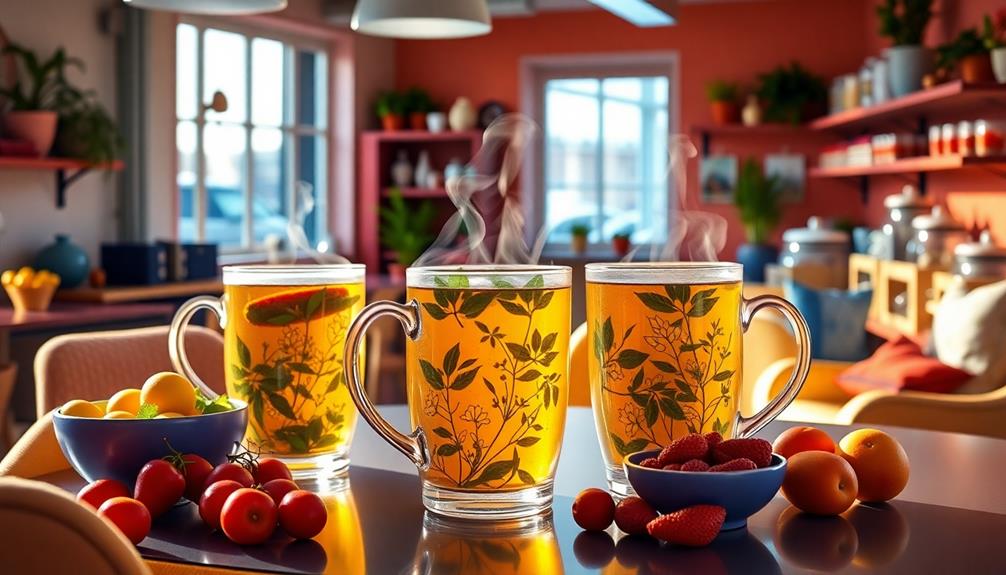
The 'lazy person's energy drink' is dominating office kitchens, especially among young professionals seeking a quick productivity boost. These drinks offer convenience and are ready-to-drink, making them perfect for busy workdays. Packed with caffeine, B vitamins, and low-calorie ingredients, they provide the energy you need without the hassle. With a focus on both flavor and health, options are evolving to cater to health-conscious consumers. As you navigate these choices, you'll find varying perceptions and trends surrounding energy drinks in workplace culture. Keep exploring to discover more about the impact these beverages have on office life.
Key Takeaways
- 'Lazy Person's Energy Drinks' offer quick energy boosts with convenient packaging, perfect for busy office environments.
- These drinks typically contain caffeine, B vitamins, and natural ingredients, catering to health-conscious consumers.
- Unique flavors often feature tropical fruits and herbs, appealing to a diverse range of taste preferences.
- Low-calorie and sugar-free options are gaining popularity, reflecting a shift towards healthier beverage choices in workplaces.
- The rise of these drinks aligns with younger professionals' demand for convenient, functional beverages in office kitchens.
Rise of Energy Drinks in Offices
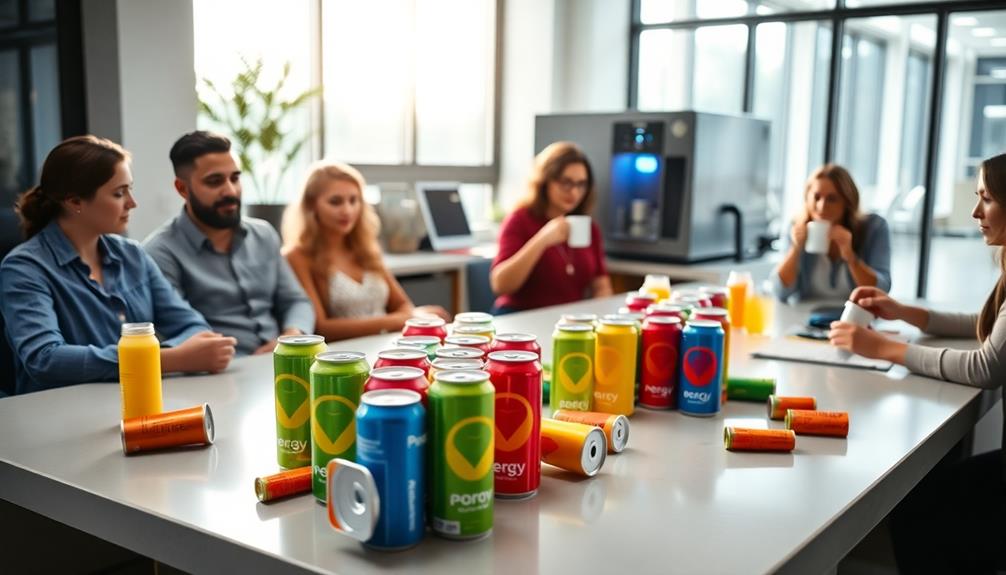
In today's fast-paced work environment, energy drinks have surged in popularity among young professionals, especially those aged 18-34. You might've noticed that brands like Red Bull and Monster are now staples in office kitchens, often replacing traditional coffee and tea.
Many workplaces stock energy drinks alongside snacks, catering to the demand for quick boosts in energy and mental alertness. The rise of energy-efficient systems, such as commercial grade heat pumps, parallels this trend, as both aim to enhance productivity and comfort in the workplace.
The global energy drink market was valued at approximately $86 billion in 2022, and it's projected to keep growing. This indicates a significant trend in workplace consumption, driven by young adults seeking efficient ways to stay energized.
You'll likely find that health-conscious options, such as sugar-free and organic energy drinks, are gaining traction too, reflecting a shift in preferences towards healthier choices.
However, the perception of energy drinks in offices can vary. Some workplace cultures embrace these beverages as energizing alternatives, while others take a more conservative stance against their consumption.
As you navigate your workday, consider how the rise of energy drinks influences your productivity and overall well-being in this dynamic environment.
Characteristics of 'Lazy Person's Energy Drink'
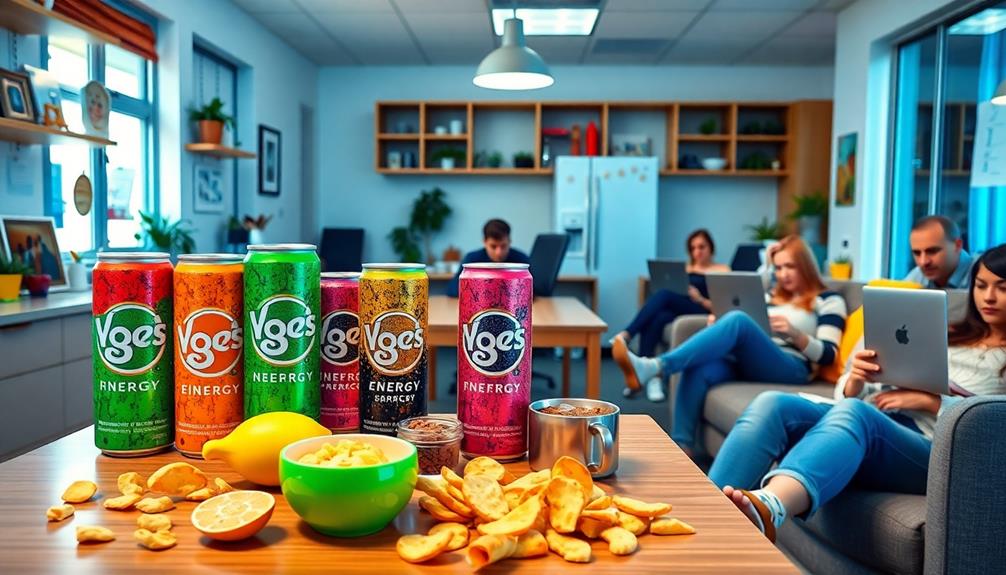
Lazy Person's Energy Drinks are designed for those who crave convenience without sacrificing energy. These ready-to-drink beverages are perfect for busy office workers like you, offering a quick energy boost without any preparation.
You'll appreciate the blend of caffeine, B vitamins, and natural ingredients that many of these drinks provide, making them a functional choice for your workday. Additionally, some energy drinks incorporate unique combinations of tropical fruits and herbs for enhanced flavor profiles, setting them apart from traditional options.
What sets these energy drinks apart is their focus on health and wellness. You'll find a variety of low-calorie and sugar-free options, catering to health-conscious consumers who want to maintain their energy levels without the guilt.
As the energy drink market continues to grow—valued at approximately $86 billion in 2022—it's clear that convenience is key.
Moreover, brands are now crafting flavors and formulations that align with your preferences, incorporating organic ingredients or additional functional benefits. This trend is especially popular among younger demographics who seek more than just a caffeine hit.
Whether you're looking for a revitalizing flavor or a specific health benefit, Lazy Person's Energy Drinks have you covered, making them a staple in today's office kitchens.
Ingredients Behind the Convenience
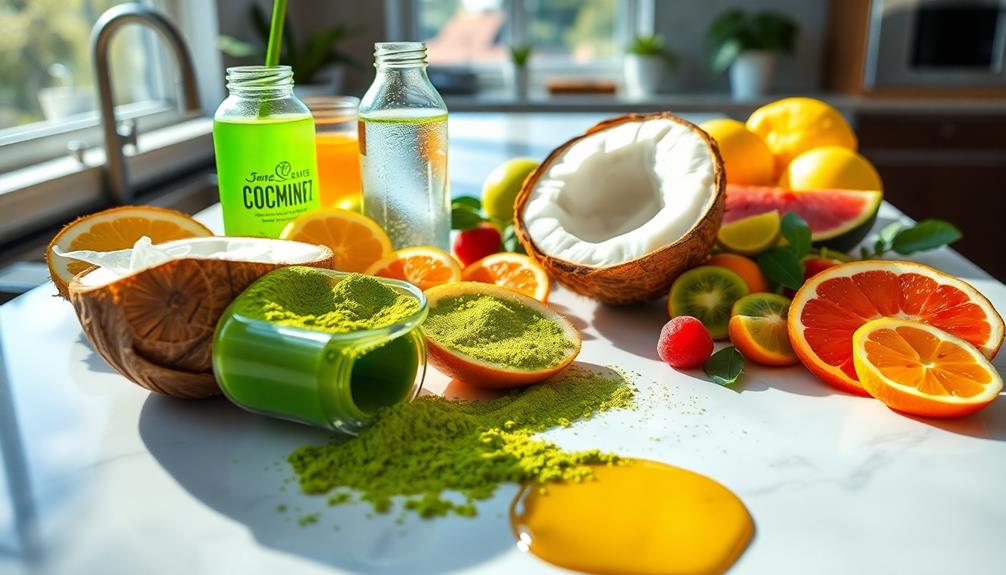
Convenience isn't just about easy access; it's also about the thoughtful ingredients packed into each can of these energy drinks. You'll often find caffeine content ranging from 70 to 200 mg per serving, offering a quick energy boost without any preparation needed. This makes it perfect for those hectic workdays when you need a lift.
Furthermore, the caffeine in these drinks can enhance athletic performance and improve focus, similar to coffee's health benefits. Many of these drinks also include taurine, an amino acid that might enhance your exercise performance and aid in recovery during your busy schedule. B vitamins are another common addition, playing a significant role in energy metabolism by converting sugars into usable energy for your body.
However, be mindful of the sugar content, which averages around 54 grams per can. While this adds to the instant energy kick, it raises concerns for long-term consumption.
On the brighter side, natural ingredients like green tea extract and nootropics are becoming popular, promoting focus and cognitive function without the jitters often associated with higher caffeine levels.
In short, these carefully chosen ingredients blend convenience with a quick energy boost, making them a staple in many office kitchens.
Health Implications and Risks

When you reach for that energy drink, it's essential to take into account the potential health risks involved.
High caffeine levels can lead to heart issues and anxiety, while excessive sugar can result in obesity and diabetes.
Additionally, certain health conditions may exacerbate these risks, making it important to consult healthcare professionals for tailored advice on treatment methods.
Mixing these drinks with alcohol only compounds the dangers, making it imperative to stay informed about what you're consuming.
Caffeine Overconsumption Risks
Caffeine can be a double-edged sword; while it offers a quick boost of energy, overconsumption poses serious health risks. If you're downing multiple caffeinated energy drinks daily, you might be flirting with health complications. The recommended daily limit for caffeine is around 400 mg for most adults, and exceeding this can lead to insomnia, increased heart rate, and heightened anxiety.
Additionally, chronic inflammation may be exacerbated by poor dietary choices often associated with high caffeine consumption, making it essential to evaluate anti-inflammatory options like herbal remedies in your diet.
Excessive intake, especially from energy drinks, has been linked to severe cardiovascular issues and even documented cases of caffeine-related deaths and seizures. You mightn't realize it, but regularly consuming these drinks can also contribute to obesity and insulin resistance, putting you at risk for metabolic disorders.
Mixing energy drinks with alcohol can mask intoxication effects, pushing you toward binge drinking, which brings its own set of dangers.
Additionally, long-term high caffeine consumption can create dependency, leading to withdrawal symptoms like headaches and fatigue when you try to cut back.
Sugar-Related Health Concerns
Many energy drinks not only pack a caffeine punch but also load you up with sugar, which can lead to serious health problems. If you're consuming these drinks regularly, you might want to reflect on the sugar-related health concerns that come along with them.
Additionally, excessive sugar intake can contribute to increased cholesterol levels, which may elevate the risk of heart disease over time, especially if you have pre-existing conditions ice cream & cholesterol.
Here are three key issues you should be aware of:
- Obesity and Diabetes Risk: Many energy drinks contain around 54 grams of sugar per can, far exceeding the American Heart Association's daily limit. This excessive intake can lead to obesity and increase your risk of type 2 diabetes.
- Dental Problems: The high sugar content, combined with the acidic nature of these beverages, can cause significant dental issues. You might experience cavities and enamel erosion if you indulge too often.
- Cardiovascular Risks: The combination of high sugar and caffeine can elevate your risk of adverse cardiovascular events, especially if you have pre-existing health conditions.
Being mindful of your energy drink consumption isn't just about caffeine; it's crucial to reflect on the sugar-related health concerns that come with it. Your health deserves better!
Mixed Beverage Dangers
Mixing energy drinks with alcohol can create a dangerous cocktail that masks the effects of intoxication, making you more likely to overindulge. When you consume energy drinks alongside alcohol, the high caffeine content may lead you to underestimate your level of drunkenness. This can result in increased alcohol consumption, raising the risk of accidents and alcohol-related harm.
Additionally, the high sugar content in these energy drinks can have negative health implications, similar to those seen in individuals consuming excessive amounts of processed foods, which can result in chronic diseases over time.
Moreover, the combination puts additional strain on your cardiovascular system. The high caffeine intake can cause an increased heart rate, leading to potentially dangerous heart issues. On top of that, energy drinks are often loaded with sugar, which can contribute to obesity, diabetes, and dental problems when consumed excessively.
You should also be aware that combining energy drinks and alcohol can heighten anxiety levels and potentially lead to addiction due to the stimulating effects of caffeine.
Regulatory bodies specifically warn vulnerable populations, like children and pregnant women, against energy drinks due to these health risks. It's crucial to evaluate these dangers before mixing beverages, as the consequences can be severe and far-reaching.
Prioritizing your health means making informed choices about what you drink.
Popular Brands and Offerings
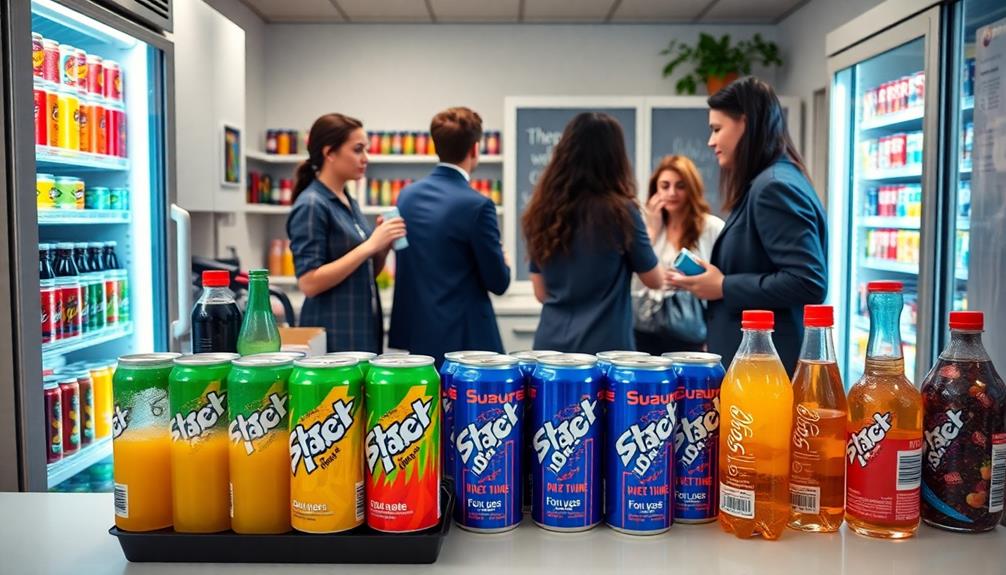
In the bustling world of energy drinks, popular brands like Red Bull, Monster, and Rockstar lead the charge, each offering unique flavors and formulations to suit your taste. Significantly, energy drinks have become a staple in many workplaces, similar to how top-rated vacuums are essential for maintaining a clean environment.
Red Bull alone sold over 7.9 billion cans in 2020, showcasing its dominance. Meanwhile, Monster Energy stands out for its extensive variety, catering to diverse consumer preferences.
Here are a few key offerings you might find appealing:
- Monster Energy: With flavors like Ultra Sunrise and Mango Loco, it provides options for everyone, including sugar-free varieties that are gaining traction among health-conscious consumers.
- Red Bull: Known for its classic taste, it's also expanded into flavors like Watermelon and Tropical—perfect for a revitalizing energy boost.
- Emerging Brands: Watch for newer brands focusing on organic and natural formulations, including lighter, seltzer-style energy drinks that appeal to those seeking a more health-conscious option.
The energy drink market, valued at approximately $86 billion in 2022, shows no signs of slowing down, indicating that these beverages continue to resonate with various demographics.
Whether you need a quick pick-me-up or a revitalizing drink, there's something out there for everyone.
Office Culture and Beverage Choices
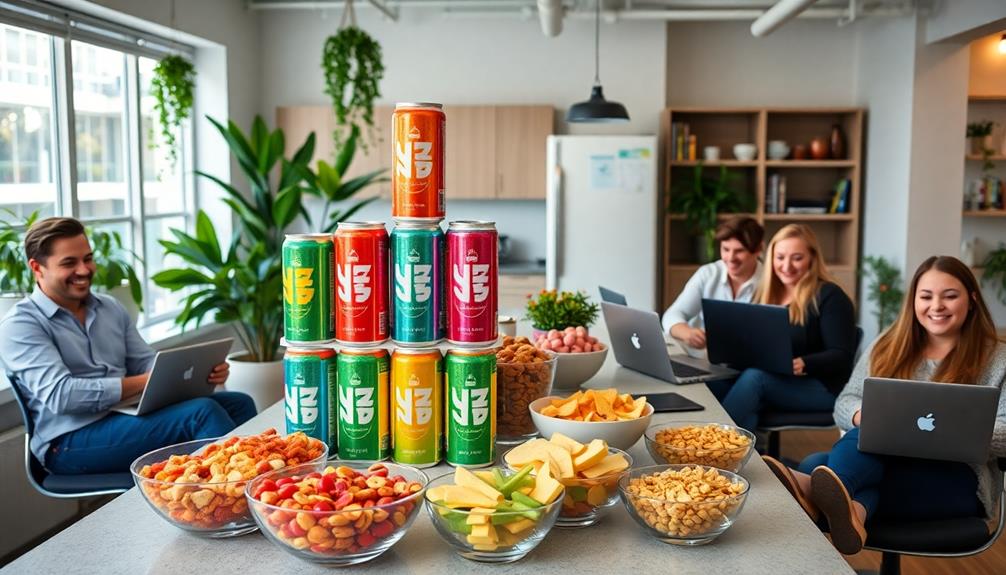
In the office, your choice of beverage can say a lot about you. While energy drinks might give you the boost you need, they can also spark conversations about professionalism and health trends among coworkers.
The impact of beverage choices can even extend to discussions about workplace productivity and engagement, as seen in trends towards personalized learning experiences that cater to individual needs.
Depending on your workplace culture, you might find yourself maneuvering the fine line between convenience and conformity in your drink selection.
Beverage Perception in Offices
Office culture shapes how beverages are perceived, and energy drinks often face scrutiny compared to the more accepted coffee. Energy drinks can also be seen as a sign of needing a quick fix rather than a sustainable energy source, contrasting with the notion of a well-planned budget that promotes long-term productivity.
Many employees feel pressured to conform to beverage norms to maintain a professional image. Here are three reasons why energy drinks might be viewed differently in the workplace:
- Professionalism: Coffee is seen as a staple in office culture. Energy drinks, on the other hand, can be viewed as less serious, leading to judgments about your work ethic.
- Appearance: Their resemblance to alcoholic beverages can raise eyebrows. Colleagues might question your choice, associating it with a lack of professionalism or discipline.
- Cultural Variability: Acceptance varies by industry. Some workplaces embrace energy drinks for boosting productivity, while others maintain a conservative stance, leading to mixed perceptions among employees.
Younger adults, particularly those aged 18-34, are more likely to consume energy drinks, with 24% to 57% reporting recent use.
Despite this, the stigma surrounding them often prompts individuals to conceal their beverage choices, fearing negative perceptions that could affect their standing in the office.
Professional Image Considerations
Beverage choices in the workplace can considerably shape how others perceive your professional image. While energy drinks may be popular, they often evoke skepticism and judgment. Colleagues might view them as unprofessional compared to traditional options like coffee and tea. This perception can lead to misunderstandings about your professionalism and health management.
Different office cultures have varying norms regarding beverage choices. In some environments, energy drinks are accepted for their performance benefits, while others enforce stricter standards. Social dynamics also play a role; you might feel pressure to opt for healthier beverages to align with colleagues.
When it comes to first impressions, especially during interviews, it's essential to reflect on your drink. Consuming energy drinks can negatively impact how interviewers perceive your professionalism.
Here's a quick comparison to illustrate these ideas:
| Beverage Type | Professional Perception |
|---|---|
| Coffee | Traditional, widely accepted |
| Tea | Calm, sophisticated |
| Energy Drink | Skeptical, potentially unprofessional |
| Water | Healthy, neutral |
| Herbal Tea | Relaxing, thoughtful |
Choosing your beverage wisely can help maintain a positive professional image.
Cultural Norms Around Drinks
While some workplaces embrace energy drinks as a quick pick-me-up, others view them with skepticism, reflecting broader cultural norms around drink choices. Your office culture can greatly influence how you're perceived based on what you choose to drink. In conservative environments, energy drinks might be frowned upon, while tech companies are often more lenient.
This dynamic can be further complicated by the privacy considerations surrounding the marketing of such beverages, as the perception of energy drinks is shaped by both personal and societal factors.
Here are three factors shaping these cultural norms:
- Professional Image: Drinking energy drinks can lead to misunderstandings about your professionalism, especially in traditional fields.
- Generational Stigma: Energy drinks are often associated with younger generations, leading to judgments based on age and beverage choices.
- Social Dynamics: Workplace social pressures can push you toward healthier options like water, making energy drinks seem less acceptable.
As you navigate these norms, it's crucial to reflect on how your choices may impact perceptions. While staying hydrated with water is always a solid choice, be mindful of how energy drinks may color your colleagues' views of you.
Ultimately, your drink selection can play a surprising role in shaping your professional image.
Consumer Demographics and Trends
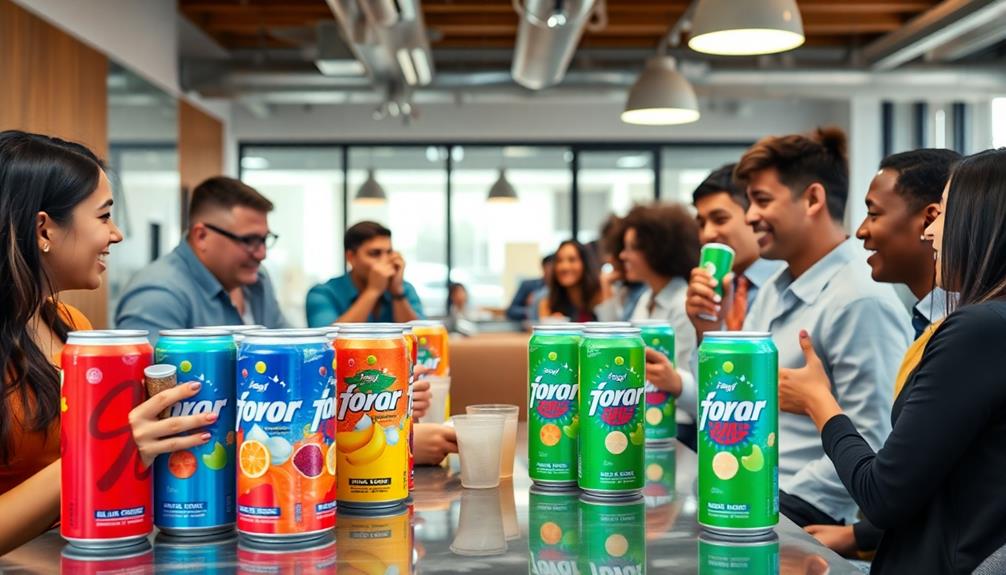
In recent years, the consumer landscape for energy drinks, particularly those marketed as 'lazy person's energy drinks,' has shifted dramatically. Young adults aged 18-34 now represent the largest segment of this market, with their consumption rates steadily increasing.
As you navigate your options, you might notice a strong preference for low-calorie and sugar-free varieties, reflecting a broader health-conscious trend among your peers.
Additionally, the rise of functional beverages emphasizes the growing consumer interest in wellness-oriented products that offer more than just a quick energy boost. You're likely to see brands that provide added health benefits gaining popularity, as they align with your desire for healthier alternatives.
Social media plays a vital role in shaping your purchasing decisions and brand loyalty, driving you towards companies that resonate with your lifestyle values, including sustainability.
Moreover, as energy drinks find their way into more office kitchens, it signals a significant shift in workplace beverage culture. Many young adults, like you, now view these drinks as convenient alternatives to traditional coffee or tea, making them a staple in many modern work environments.
Perceptions of Energy Drinks at Work

As energy drinks become more common in workplaces, perceptions surrounding their consumption have evolved. While some view them as a quick boost, others see them as less professional than traditional options like coffee or tea. This cultural divide affects how you're perceived when reaching for that can during a busy workday.
Here are three common perceptions about energy drinks at work:
- Health Concerns: Colleagues might scrutinize your choice, associating energy drinks with poor health management.
- Alcohol Misconceptions: The appearance of energy drinks can resemble alcoholic beverages, leading to misunderstandings about your drinking habits in a professional setting.
- Generational Differences: Younger adults (ages 18-34) tend to consume energy drinks more frequently, impacting how different generations judge each other's beverage choices.
In many workplaces, drinking energy drinks during interviews is discouraged. First impressions matter, and your choice of beverage can influence how potential employers perceive you.
Understanding these perceptions can help you navigate the complexities of beverage choices in a professional environment while ensuring you still get that much-needed energy boost.
Tips for Responsible Consumption
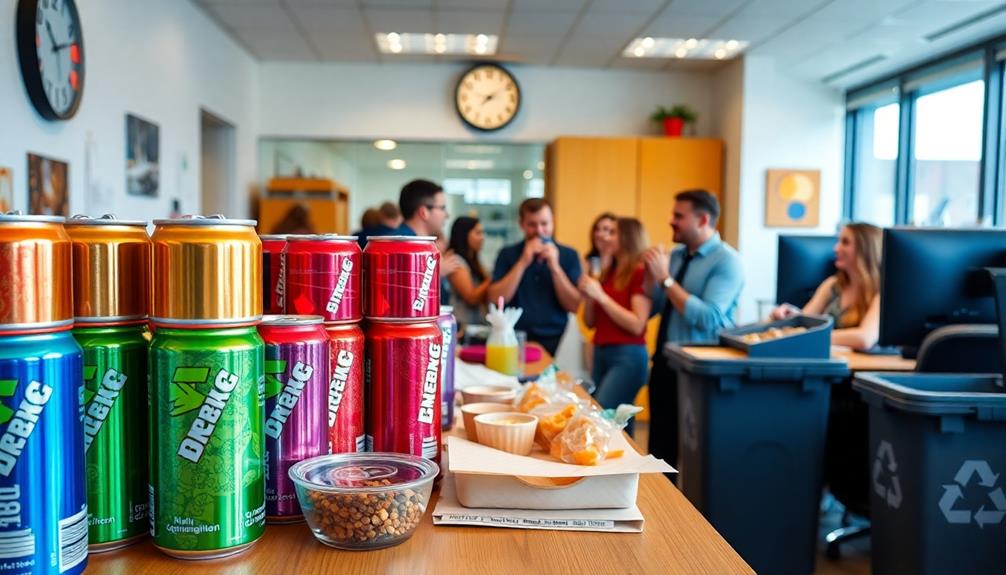
Energy drinks can provide a quick pick-me-up, but responsible consumption is key to reaping their benefits without the drawbacks. To start, limit your intake to just one can per day. This keeps you within the recommended caffeine limit of 400 mg for most adults, helping you avoid issues like insomnia and an increased heart rate.
When choosing your energy drink, opt for sugar-free or low-calorie options. Many drinks are loaded with sugar, which can contribute to obesity and raise your risk of diabetes.
It's also vital to avoid mixing energy drinks with alcohol; this combination can mask intoxication effects and lead to risky behaviors.
Pay attention to how your body reacts after consuming energy drinks. If you notice increased anxiety or heart palpitations, consider reducing your consumption or switching to drinks with lower caffeine per serving.
Finally, stay informed about the ingredients in your chosen beverage. Not all energy drinks are created equal, and some may contain additives with unknown health effects.
Frequently Asked Questions
What Energy Drink Went Out of Business?
Several energy drinks have gone out of business, like Hype Energy in 2020 and Freaky Energy in 2018. They struggled with competition and low sales, proving the market's challenges for new and existing brands.
What Energy Drink Company Got Sued?
You might've heard that Monster Beverage Corporation got sued in January 2023. The lawsuit claims they misled consumers about the health effects of their energy drinks, particularly regarding high caffeine content and associated risks.
What Energy Drinks to Stay Away From?
You wouldn't want to sip on energy drinks like Monster or Red Bull, packed with excessive sugar and caffeine. They can spike anxiety and lead to health issues, so steer clear for better wellbeing!
Is It Safe to Drink Lipovitan Every Day?
Drinking Lipovitan every day isn't recommended. It can lead to increased heart rate, anxiety, and potential addiction due to high caffeine. Moderation is key, so consider your health and daily caffeine limits before indulging.
Conclusion
When it comes to energy drinks, remember: "All that glitters is not gold." While the 'lazy person's energy drink' offers a quick boost in office kitchens, it's vital to be mindful of what you're consuming. Balance convenience with health by understanding the ingredients and potential risks. By making informed choices, you can enjoy that extra energy without compromising your well-being. So, next time you reach for that can, think twice and sip smart!
In the vast and diverse world of coffee, coffee alternatives, and tea, Olivia has found her calling. As an author and a dedicated coffee and tea aficionado, her work for Cappuccino Oracle reflects her profound love and understanding of the intricate complexities found within these beverages. Olivia’s passion for the subject serves as both a catalyst for her creativity and a connection point with her audience.
Olivia’s appreciation for coffee, coffee alternatives, and tea blossomed at an early age. She discovered that these beverages invigorated her senses and stimulated her creative spirit. From the nuanced flavors of single-origin roasts to the captivating narratives intertwined with coffee, coffee alternatives, and tea trade and culture, Olivia found an unlimited source of inspiration in her daily cup.
Her love for these beverages and her talent for storytelling eventually converged at Cappuccino Oracle. As an author, Olivia’s mission is to illuminate the intricate tapestry that makes up the world of coffee, coffee alternatives, and tea. Her articles span a diverse range of topics, encompassing everything from the unique flavors of different brews to the sociocultural history intertwined with their cultivation and consumption.
Turmeric Tea
What Kombucha Tea Is Good for Gerd
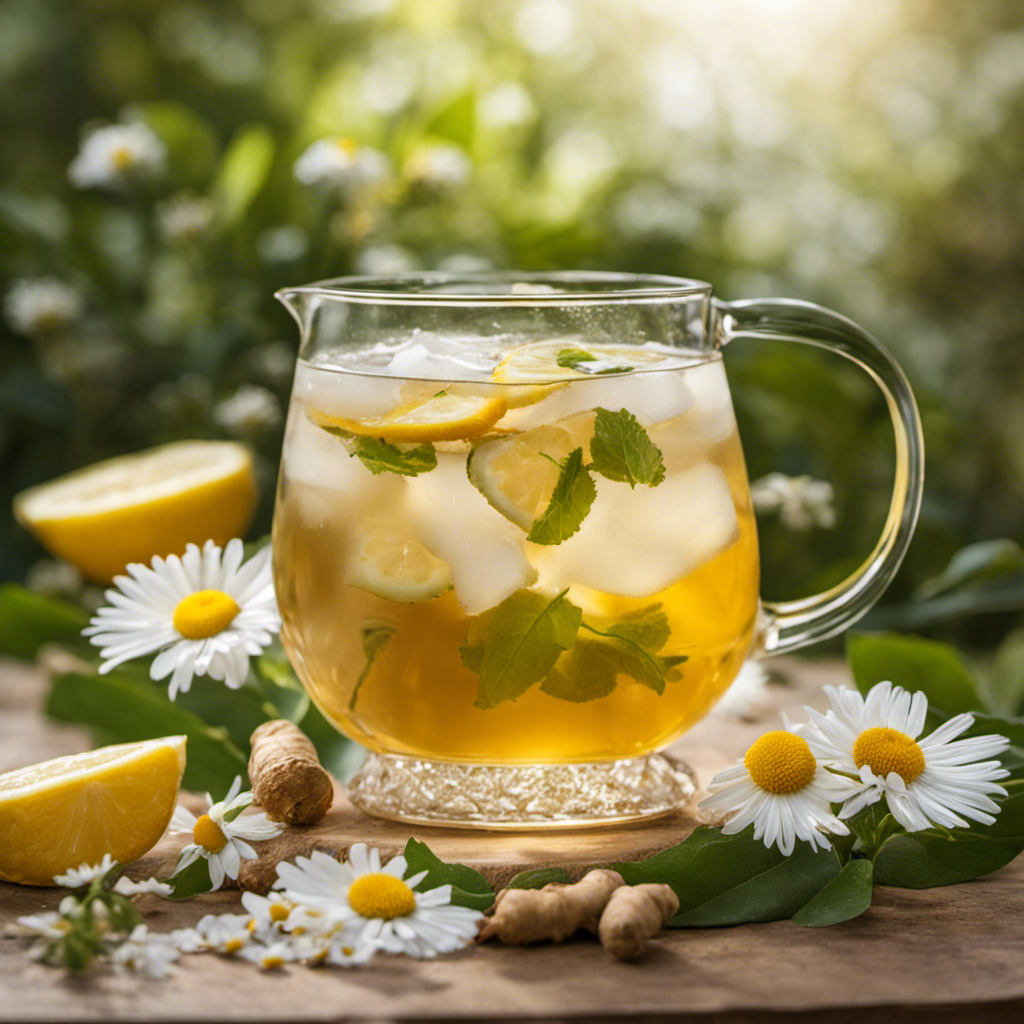
As someone who deals with GERD, I understand the challenge of finding effective natural remedies. I was excited to find out about how **kombucha tea** could help alleviate GERD symptoms. If you want to learn more about this natural remedy, keep reading!
In this article, we’ll explore the science behind how kombucha tea can soothe GERD and offer relief. We’ll also discuss how to choose the right kombucha tea and ways to incorporate it into your GERD diet.
Get ready to brew some delicious and potentially soothing kombucha tea for your GERD!
Key Takeaways
- Kombucha tea can relieve symptoms of GERD, such as heartburn and acid reflux.
- Choosing the right kombucha tea for GERD relief involves considering soothing flavors like ginger, lemon, and chamomile, as well as low sugar and minimal added ingredients.
- Kombucha tea soothes GERD symptoms by balancing stomach acidity, reducing acid reflux, and improving digestion with its beneficial bacteria and enzymes.
- When incorporating kombucha tea into a GERD diet, it is important to monitor its effects on symptoms, consider individual responses, and take into account factors such as acidity levels, sugar content, and personal tolerance.
The Benefits of Kombucha Tea for GERD
Kombucha tea can help relieve symptoms of GERD, such as heartburn and acid reflux. The benefits of consuming kombucha tea for GERD are supported by its health effects on the digestive system.
Kombucha is a fermented beverage that contains probiotics, which are beneficial bacteria that promote gut health. These probiotics can help restore the balance of bacteria in the digestive tract, reducing symptoms of GERD.
Additionally, kombucha tea is a natural source of organic acids, such as acetic acid and gluconic acid, which can help regulate stomach acidity and prevent the excessive production of stomach acid that leads to heartburn and acid reflux.
Overall, incorporating kombucha tea into your diet can have positive effects on GERD symptoms and improve your overall digestive health.
Choosing the Right Kombucha Tea for GERD Relief
When selecting the right option, make sure to consider the flavors and ingredients that may aggravate your GERD symptoms. It’s important to find kombucha flavors that are soothing and gentle on the digestive system. Some flavors that are known to provide relief for GERD sufferers include ginger, lemon, and chamomile. These flavors have anti-inflammatory properties and can help soothe the lining of the esophagus. When looking for kombucha brands, it’s best to choose ones that are low in sugar and have a minimal amount of added ingredients. Some popular brands that cater to GERD sufferers include GT’s Living Foods, Health-Ade, and Brew Dr. Kombucha. These brands offer a variety of flavors that are suitable for individuals with GERD.
| Brand | Flavors for GERD Relief |
|---|---|
| GT’s Living Foods | Ginger, Lemon |
| Health-Ade | Ginger, Lemon |
| Brew Dr. Kombucha | Ginger, Chamomile |
| Synergy | Ginger, Lemon |
| Kevita | Lemon, Chamomile |
How Kombucha Tea Can Soothe GERD Symptoms
If you’re struggling with GERD, it’s worth exploring how kombucha can provide relief for your symptoms.
Kombucha tea is known for its many health benefits, including its potential to soothe GERD symptoms. The fermentation process of kombucha produces organic acids, such as acetic acid and gluconic acid, which can help balance the pH levels in the stomach and reduce acid reflux.
Additionally, kombucha contains beneficial bacteria and enzymes that can improve digestion and promote a healthy gut.
To make kombucha tea at home, you’ll need a SCOBY (symbiotic culture of bacteria and yeast), black or green tea, sugar, and filtered water. Simply brew the tea, add sugar, cool it down, and let the SCOBY ferment the mixture for about 7-14 days.
Enjoy your homemade kombucha tea and potentially find relief for your GERD symptoms.
Incorporating Kombucha Tea Into Your GERD Diet
To incorporate it into your GERD diet, try drinking kombucha in small amounts and monitoring how it affects your symptoms. Kombucha tea can play a role in managing GERD symptoms due to its potential beneficial effects on gut health. However, it is important to note that individual responses may vary, so it is essential to listen to your body and adjust accordingly. Here is a table outlining the potential benefits and considerations of incorporating kombucha tea into your GERD diet:
| Potential Benefits | Considerations |
|---|---|
| Probiotic properties | Acidity levels |
| Antioxidant content | Sugar content |
| Potential anti-inflammatory effects | Caffeine content |
| Improved digestion | Personal tolerance |
| Hydration | Quality and safety of the tea |
Incorporating kombucha tea into your GERD diet can be a personal choice based on your individual needs and preferences. It is always recommended to consult with a healthcare professional or registered dietitian before making any significant changes to your diet.
Tips for Brewing Kombucha Tea for GERD Relief
Brewing kombucha at home can be a cost-effective way to customize the flavors and control the ingredients for your GERD relief.
When it comes to brewing techniques, it’s important to follow proper sanitation practices to prevent contamination. Start by brewing a batch of black or green tea, then add sugar and a SCOBY (Symbiotic Culture of Bacteria and Yeast).
Fermentation typically takes around 7-14 days, but it’s essential to taste-test regularly to achieve the desired acidity. To enhance the flavor of your kombucha for GERD relief, consider incorporating ingredients like ginger or chamomile, known for their soothing properties.
Keep in mind that some flavors, like citrus or spicy ones, may trigger GERD symptoms in some individuals. Experiment with different combinations to find what works best for you.
Frequently Asked Questions
Can Kombucha Tea Completely Cure Gerd?
While kombucha tea has been praised for its potential health benefits, it is important to note that it is not a replacement for medication for GERD. Additionally, some individuals may find that kombucha exacerbates their GERD symptoms.
Can I Drink Kombucha Tea if I Am on Medication for Gerd?
Yes, you can drink kombucha tea while taking medication for GERD. However, it is important to consult with your doctor to ensure that kombucha is a suitable addition to your GERD treatment plan.
Is It Safe to Drink Kombucha Tea if I Have Other Digestive Disorders?
I wondered if it was safe to drink kombucha tea with my other digestive disorders. I researched its effects on digestive disorders and found potential risks. I’ll share what I discovered.
How Much Kombucha Tea Should I Drink Daily for GERD Relief?
For optimal GERD relief, I suggest drinking a daily dosage of kombucha tea. The best time to drink it would be before meals to aid digestion. However, consult with a healthcare professional for personalized advice.
Are There Any Potential Side Effects of Drinking Kombucha Tea for Gerd?
There are potential risks and long-term effects of drinking kombucha tea for GERD. It’s important to consider these before incorporating it into your routine.
Conclusion
In conclusion, after exploring the benefits of kombucha tea for GERD and how it can soothe symptoms, it is evident that incorporating this fermented beverage into your diet can be a valuable addition.
Just like a lighthouse guides ships safely through stormy waters, kombucha tea provides relief and support for those navigating the challenges of GERD.
By choosing the right kombucha tea and brewing it properly, individuals can experience the potential benefits and find comfort in managing their GERD symptoms.
Remember, always consult with a healthcare professional before making any significant changes to your diet.
Noah, the Editor-in-Chief at Cappuccino Oracle, plays a pivotal role in shaping the voice and vision of our renowned platform. With an unwavering passion for coffee, coffee alternatives, and tea, Noah leads Cappuccino Oracle towards new horizons in the realm of coffee journalism.
Beyond his professional responsibilities, Noah serves as a mentor and guiding force for his team. His dedication to journalistic excellence and genuine love for coffee, coffee alternatives, and tea continue to inspire and motivate the Cappuccino Oracle family. In the ever-evolving world of these beverages, Noah’s leadership ensures that our platform remains at the forefront, delivering enlightening and enjoyable content to our readers worldwide.
-
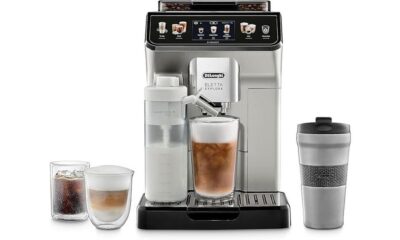
 Espresso Machines Reviews4 weeks ago
Espresso Machines Reviews4 weeks agoDeLonghi Eletta Explore: A Comprehensive Review [2025]
-
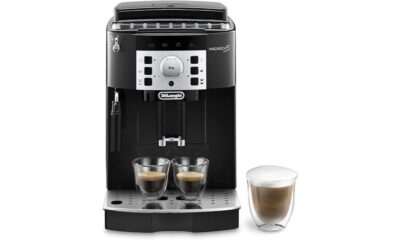
 Espresso Machines Reviews4 weeks ago
Espresso Machines Reviews4 weeks agoDeLonghi Magnifica S ECAM22.110.B Review: A Coffee Lover's Dream [2025]
-
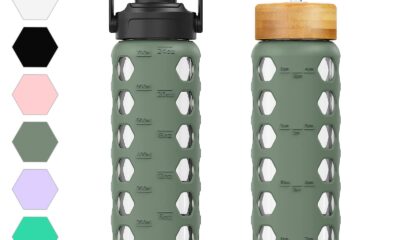
 Cappuccino Oracle Selected Reviews4 weeks ago
Cappuccino Oracle Selected Reviews4 weeks agoBest Glass Water Bottles for Eco-Friendly Hydration [2025]
-
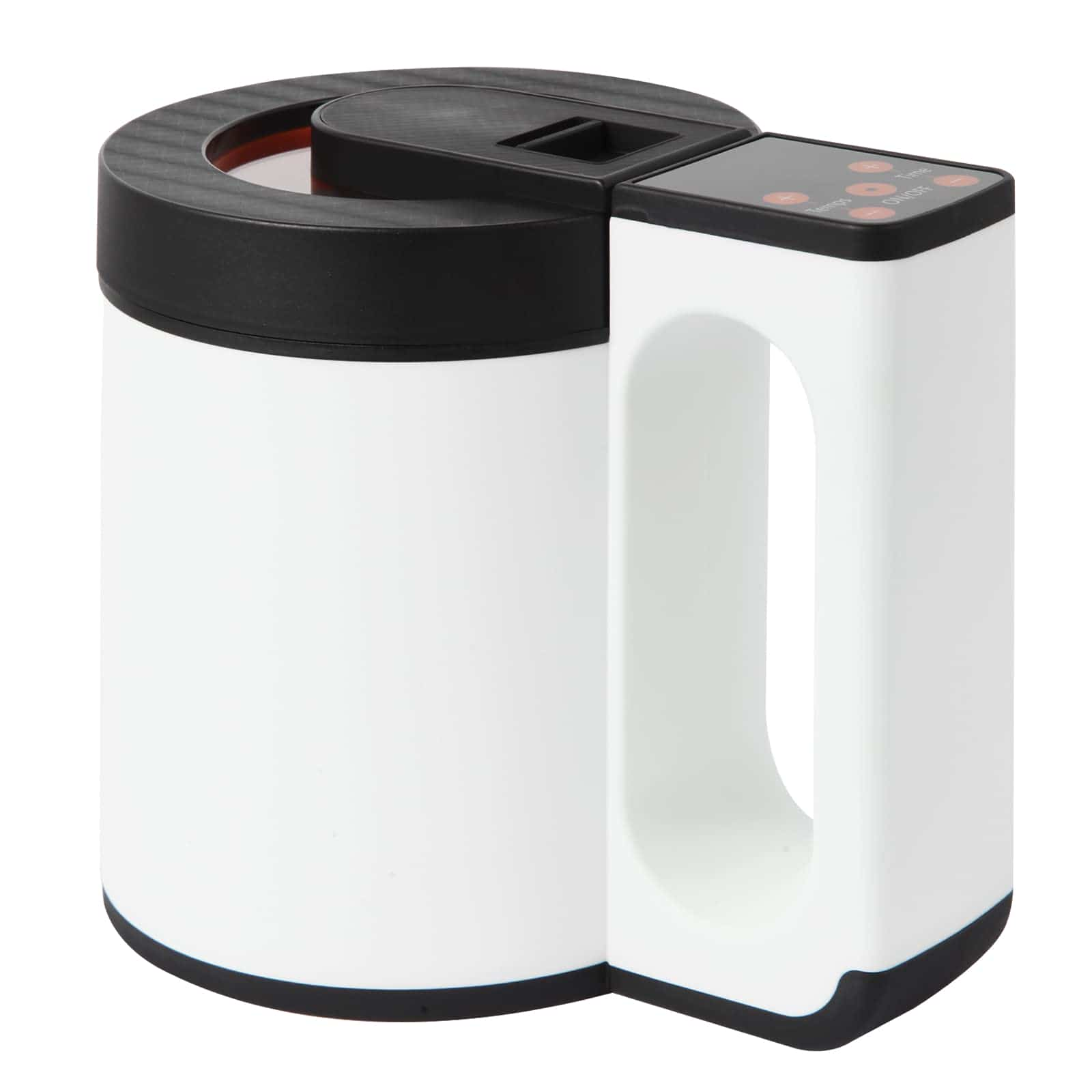
 Cappuccino Oracle Selected Reviews1 week ago
Cappuccino Oracle Selected Reviews1 week agoHighPlant HerbAblility Decarboxylator and Infusion Machine Review (2025)
-
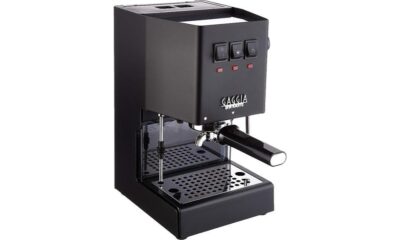
 Espresso Machines Reviews4 weeks ago
Espresso Machines Reviews4 weeks agoGaggia Classic Evo Pro Espresso Machine Review [2025]
-
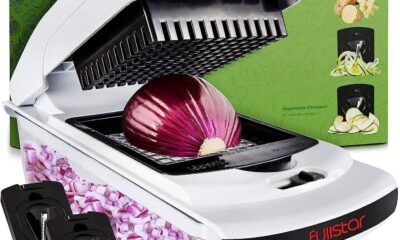
 Cappuccino Oracle Selected Reviews4 weeks ago
Cappuccino Oracle Selected Reviews4 weeks agoBest Onion Choppers for Efficient and Consistent Chopping [2025]
-

 Cappuccino Oracle Selected Reviews2 weeks ago
Cappuccino Oracle Selected Reviews2 weeks agoNinja JC151 NeverClog Cold Press Juicer Review
-
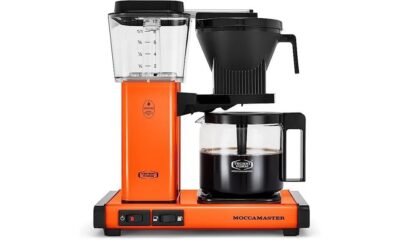
 Espresso Machines Reviews2 weeks ago
Espresso Machines Reviews2 weeks agoTechnivorm Moccamaster KBGV Review: The Perfect Coffee Maker




























